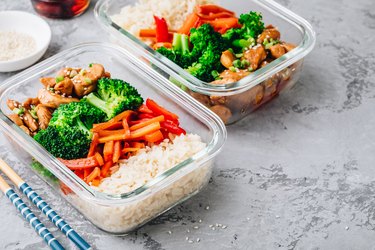
Contrary to popular belief, eating a wholesome diet doesn't require spending a fortune. While you might need a fatter wallet for some organic foods, it's still possible to purchase healthy products within your budget.
Here, experts share straightforward, simple strategies for slashing your grocery bill without sacrificing your nutritional needs.
Video of the Day
Video of the Day
1. Buy in Bulk
"The more you buy, the cheaper it gets," says Nick Briney, CPT, senior personal training manager at Life Time with expertise in nutritional coaching.
Briney suggests stocking up on staples to get the best bang for your buck. Think: dried beans, oats and other whole grains. "Admittedly, you may spend a little more money upfront, but you are sure to save in the long run," he adds.
Briney recommends scouting the bulk-buy bins at your local supermarket or shopping at superstores like Costco , BJ's and Sam's Club, which are known for their economical, wholesale options.
And if you prefer to shop from the comfort of home, Briney says you can purchase plenty of products in bulk at online food retailers including Freshly, Vitacost and Thrive Market.
2. Peep Unit Prices
True, buying in bulk can be a bargain, but don't just assume that the larger size is always a better deal, Yumna Jawad, food blogger and creator of Feel Good Foodie, tells LIVESTRONG.com.
"Sometimes a product is exactly double the size and double the money with no savings, so you may end up spending more on the bigger size, and possibly not finishing the product before it spoils or expires," she says.
To avoid this, always check the unit price. "Many stores offer unit price labels which can help you compare price per unit (whether it's ounce or pound) to see what the best deal is," she says.
3. Purchase With the Right Plastic
Saving money is just one swipe away. Even better than clipping coupons, you can bring in big benefits for supermarket shopping by using certain credit cards.
"When you accumulate enough rewards, it's like getting free items or a discount at the store without doing anything differently," Jawad says.
If you own multiple credit cards, find out which one offers the highest cash back amount on groceries and try using that card only when you shop for food.
And if you tend to shop at one retailer regularly, consider applying for a store-based credit card. For instance, Target lovers can opt for the Red Card, which entitles you to 5 percent off every online or in-store purchase, including clearance items and daily deals.
If you're looking for new plastic, consider the Blue Cash Preferred Card from American Express, which offers 6 percent cash back for grocery store buys — that's a solid $360 back in your pocket if you spend the $6,000 maximum on supermarket purchases per year (but note that the card comes with an annual fee).
4. Download an App
There's an app for everything — even for saving cash on groceries.
Apps such as Ibotta, Checkout 51 and Fetch Rewards allow you to upload your receipt after your food-shopping trip for cash back rewards or gift cards for major retailers.
5. Buh Bye, Brand Name
When you need to stretch a dollar, generic is the way to go. "Generic items are usually produced as an imitation of their branded equivalents on a much larger scale to reduce cost," Jawad says.
And, you might be surprised to learn that there's little difference between big-name brand items and the lesser-known generic varieties — other than the front of the box.
Not convinced? Compare the ingredients list between your go-to name brands and their cheaper counterparts. "Chances are, the ingredients are almost identical, especially if you're doing your part to stick with foods that have fewer total ingredients," Briney says.
So, "if you're not looking for anything unique like a specific taste or texture, opt for generic, especially when buying bottled water or baking supplies like flour and baking powder," Jawad says.

6. Shop in Season
Produce can be pricey. Case in point: A short-season crop like cherries can cost you a bundle (up to $5 dollars a pound!).
That's why it's smarter to stick to in-season fruits and veggies. And if they're locally grown, that's even better for your pocket (and the environment).
That's because most out-of-season foods have to be shipped from farther away to meet stocking demands, Briney says.
So not only do they come with an added monetary cost, but depending on farming practices, water and land use and mode of transport, they may also cause more harmful CO2 emissions, as noted in a March 2016 paper in Environmental Research Letters.
What's more, these non-seasonal items spoil faster. "Often, they have a shorter shelf life due to the extra time spent in shipping and processing," Briney explains.
7. Start from Scratch
"Cooking from scratch is a major money saver," Briney says. You may have to dust off your cookbook — and sacrifice the convenience of your pre-cut veggies and frozen pizza — but it's so worth it.
"Often, you'll be able to get up to two to three times as much food for the same amount you spend on a pre-made, heat-and-eat-style meal," he says.
Jawad agrees: The price of ready-to-eat meals might save you minutes you would've spent chopping onions or boiling pasta, but it's not worth all the extra money you'll waste, especially if you're shopping on a shoestring budget.
Plus, you'll have more power over what goes on your plate. When you cook from scratch, "your quality of food is much better than eating something that has extra ingredients just for preservation," Briney adds. That means less salt, sugar and saturated fats, and fewer additives.
8. Minimize Meat
Listen up, carnivores: The meat on your weekly menu may be draining your wallet dry.
"Animal proteins are usually the highest-priced items on the grocery list," according to Briney, who adds, "Finding alternative ways to get your protein can be a game-changer when you are trying to save a few bucks."
Healthy plant-based proteins including chickpeas, lentils, beans, hemp seeds, chia seeds and tofu — as well as dairy products and eggs — are great alternatives for your purse, not to mention your overall health.
Indeed, an August 2019 study in JAMA Internal Medicine found that replacing the meat on your plate with more plant-derived proteins is linked to lowering your risk of certain cancers and heart disease as well as lengthening your lifespan.
Plus, eating fewer meatless meals and more nutritious foods such as whole grains, fruits, vegetables, nuts, legumes and olive oil is a more sustainable solution for the planet, according to a large analysis published in the October 2019 issue of Proceedings of the National Academy of Sciences.
9. Plan Ahead
There's no better way to squander cash than food shopping without a proper plan. "The more you plan, the less you waste whether you're planning your time, planning your money or planning your meals," Jawad says.
Prepping meals in advance will help you stay focused on what you need for the week and keep you on budget.
"Having a rough outline of three to four dinner ideas can set you up for success by eliminating unnecessary trips to the grocery store, stretching similar ingredients for two planned meals and reducing impulse shopping," according to Jawad. This way, you don't make pointless purchases and spend your money unnecessarily.
Not to mention, meal planning can also help you avoid spur-of-the-moment, unhealthy food choices. "If you don't buy it, you can't eat it," Briney says.

10. Live for Leftovers
If you want to save money (and time), leftovers can be a lifesaver. "The convenience of a homecooked leftover meal beats that fast food lunch you would have ordered instead" (and squandered coins on), Briney says.
He suggests making each of your meals in double portions and storing your leftovers in a glass container for lunch the next day.
And if eating the same thing several days in a row doesn't float your boat, freeze the food for a later date. Or, get creative and repurpose your scraps into a new dish.
Toss leftover grilled chicken chunks into a low-sodium broth with whole-grain noodles and veggies and voila — you have a hearty, homemade chicken soup.
Related Reading
11. Hone in on Healthy Foods
"Eating whole foods is crucial when seeking to optimize your overall health and fitness," Briney says.
And just because you want to spend less on groceries, doesn't mean you have to forego these benefits. On the contrary, many nutritious foods are within your means.
"Nutrient-dense, whole foods — like veggies, fruits, legumes, nuts and seeds — are much more affordable" than other items in the supermarket aisles, Briney says.
For instance, a can of protein-packed beans (includes 3.5 servings) can cost as low as 99 cents and a 32-ounce bag of fiber-rich brown rice (that's 22 servings) may run you less than $3.
12. Store to Save
Nothing's more wasteful for your wallet — or the environment — than letting food rot in your fridge or expire on your shelves.
"Proper food storage is key to helping you stretch items from the grocery store," according to Jawad.
"By properly storing herbs in a mason jar filled with water or keeping mushrooms in a paper bag, for example, you can extend the life of your produce and reduce unnecessary spending on spoiled foods," she says.
13. Grow Your Own Garden
"If you have the space, time and discipline to plant your own food, growing your own garden is a great way to save money," Briney says.
For instance, a pack of herbs from the grocery store may run you $5. That's a bit pricey when you consider that they will only be sufficient to season a meal or two.
Conversely, potted herbs of equal cost can be the gift that keeps on giving. With proper care, they may last for months and add flavor to countless dishes.
"Plus, you can't beat the comfort of knowing exactly where your food is coming from," Briney adds. "The more self-sourced food we can provide for ourselves, the better."
Related Reading
- Journal of the American Medical Association Internal Medicine (JAMA): “Association of Animal and Plant Protein Intake With All-Cause and Cause-Specific Mortality in a Japanese Cohort.”
- Proceedings of the National Academy of Sciences (PNAS): “Multiple health and environmental impacts of foods.”
- Environmental Research Letters: “Environmental impacts of food trade via resource use and greenhouse gas emissions.”